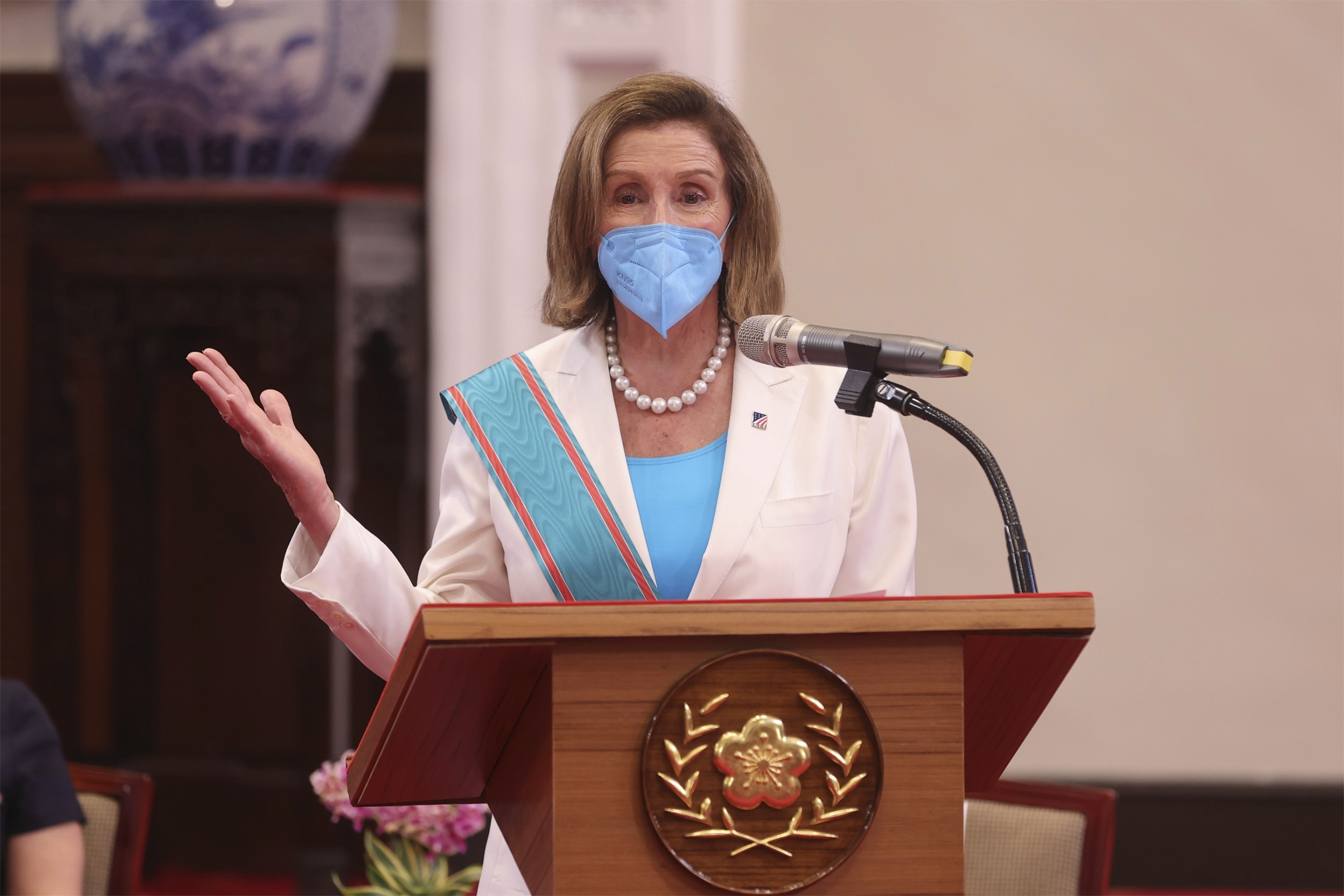U.S. Speaker of the House Visits Taiwan
On 2-3 August, U.S. Speaker of the House Nancy Pelosi paid a visit to Taiwan, the first visit of a sitting leader of Congress in 25 years. China considered the visit a violation of its sovereignty and responded by imposing economic sanctions on Taiwan and launching live-fire drills around the island. Tensions in the Taiwan Strait can be expected to continue or escalate at least until the start of the 20th National Congress of the Chinese Communist Party (CCP) this autumn.
 Simon Liu/Taiwan Presidential/Zuma Press/Forum
Simon Liu/Taiwan Presidential/Zuma Press/Forum
Under what circumstances did the visit take place?
Pelosi’s visit took place during a period of tension in U.S.-China relations, China-Taiwan relations, and the Russian aggression against Ukraine (with the former supported by China) amid U.S. involvement in backing the defending state. It also took place a few months before important political events in China, the U.S., and Taiwan. China is preparing for the CCP’s 20th National Congress, during which leader Xi Jinping will seek a third term as General Secretary, breaking the unwritten rule of a maximum of two five-year terms. Meanwhile, in the U.S., congressional elections will be held in November, in which, according to polls, the Democratic Party could suffer heavy losses, resulting in the loss of its majority in the House of Representatives. Moreover, there was no consensus among Democrats, including administration officials, about Pelosi’s visit to Taiwan. President Joe Biden and his advisors, as well as military leaders, publicly suggested that the timing of the visit was inappropriate. Taiwan also will hold local elections in November (“nine-in-one” for nine different types of offices), which will be the first major vote before the island’s presidential and parliamentary elections in early 2024.
How did Pelosi’s visit go?
Until the plane with the Congressional delegation headed by Pelosi landed in Taipei on the evening of 2 August, the visit had not been confirmed by either the U.S. or Taiwanese sides. Given China’s threats that it would consider a visit a violation of its sovereignty and respond, Taiwan’s military raised its combat readiness level just hours before the plane touched down. China, meanwhile, limited civilian air traffic over Fujian province, which is closest to Taiwan. Foreign Minister Joseph Wu of Taiwan welcomed Speaker Pelosi at the airport. The next day, Pelosi met with President Tsai Ing-wen, who honoured her with the Order of Propitious Clouds with Special Grand Cordon, the highest civilian order, and with Taiwanese parliamentarians. She also visited the National Museum of Human Rights (opened in 2018), which documents the period of the White Terror (1949-1992), a time of repression during the dictatorial rule of the Kuomintang (Taiwan’s democratisation processes began in the late 1980s). Pelosi also met with human rights activists and dissidents, including one of the leaders of the 1989 Tiananmen Square protests in Beijing.
What was the goal of her visit?
According to Pelosi, the aim was to send a strong signal of solidarity and support for Taiwan, especially in a time when the world is facing a choice between democracy and autocracy. She stressed that there is a bipartisan consensus to support Taiwan and that the U.S. will not abandon its commitment to Taiwan under the Taiwan Relations Act (TRA) of 1979, a document that defines U.S.-Taiwan relations after the United States established diplomatic relations with mainland China (PRC). According to the TRA, the U.S. should provide Taiwan with defensive weapons and maintain its ability to resist attempts to use force or other forms of coercion that could threaten the security of the Taiwanese people. At the same time, Pelosi indicated that her visit does not contradict the one-China policy and that the United States continues to oppose unilateral efforts to change the status quo (i.e., by either China or Taiwan).
How has China reacted?
The PRC authorities considered the visit a violation of China’s sovereignty and territorial integrity and a serious undermining of peace and stability in the Taiwan Strait. The visit was described as a provocation and playing with fire. According to China, the visit is evidence of U.S. support for separatist and independence forces in Taiwan. Chinese authorities said Congress is an integral part of the U.S. government, so it should adhere to the one-China principle. The PRC has imposed economic sanctions on Taiwan, halting imports of 2,000 (out of just over 3,000) agri-food products from the island in an attempt to hit the electorate of Taiwan’s ruling Democratic Progressive Party. The PRC authorities also halted exports to Taiwan of natural sand used in construction. China was also likely behind hacking attacks on Taiwanese government websites and businesses. China’s Defence Ministry announced that large-scale live-fire military drills will be held from 4-7 August in six areas around the island. The scope of these exercises is larger than during the 1995-1996 cross-strait crisis, and they also will be conducted closer to Taiwan itself. Most of China’s designated military exercise areas are within Taiwan’s air defence identification zone, and some are even in Taiwan’s territorial sea. The manoeuvres simulate a blockade of the island.
What will be the longer-term consequences of Pelosi’s visit?
The most significant result will be the increased tensions in the Taiwan Strait. Although the likelihood of a Chinese attack on Taiwan is still low, as China lacks the capability to carry it out, the demonstration of force by its forces under the People’s Liberation Army increases the likelihood of military incidents. The tensions will continue or escalate at least until the 20th CCP Congress this autumn. With nationalist Chinese sentiment rekindled under Xi Jinping's rule, in which unification of the island with the mainland is essential to the full “rejuvenation of the Chinese nation”, China’s leader cannot help but react to the visit. Chairman Xi’s reaction to the situation in the Taiwan Strait may be perceived by party activists, on whose support Xi relies for his broad hold on power, as an expression of his determination and the strength of his leadership. The direct consequences of the visit will be borne by Taiwan, which is facing Chinese economic sanctions and a large demonstration of its neighbour’s military capacities. Increased hacking and disinformation activities by China are also possible, and they would have goal of undermining support for the ruling DPP. An increase in cross-strait tensions, especially in the long term, could also raise doubts among U.S. allies about its role as the guarantor of stability in the region. The rise and persistence of tension in the Taiwan Strait may also distract the international community from the Russian aggression against Ukraine, which may encourage Vladimir Putin to escalate Russia’s actions there. China’s provocations may also test the U.S. readiness to simultaneously engage in two distant crises involving its most serious rivals, China and Russia.


